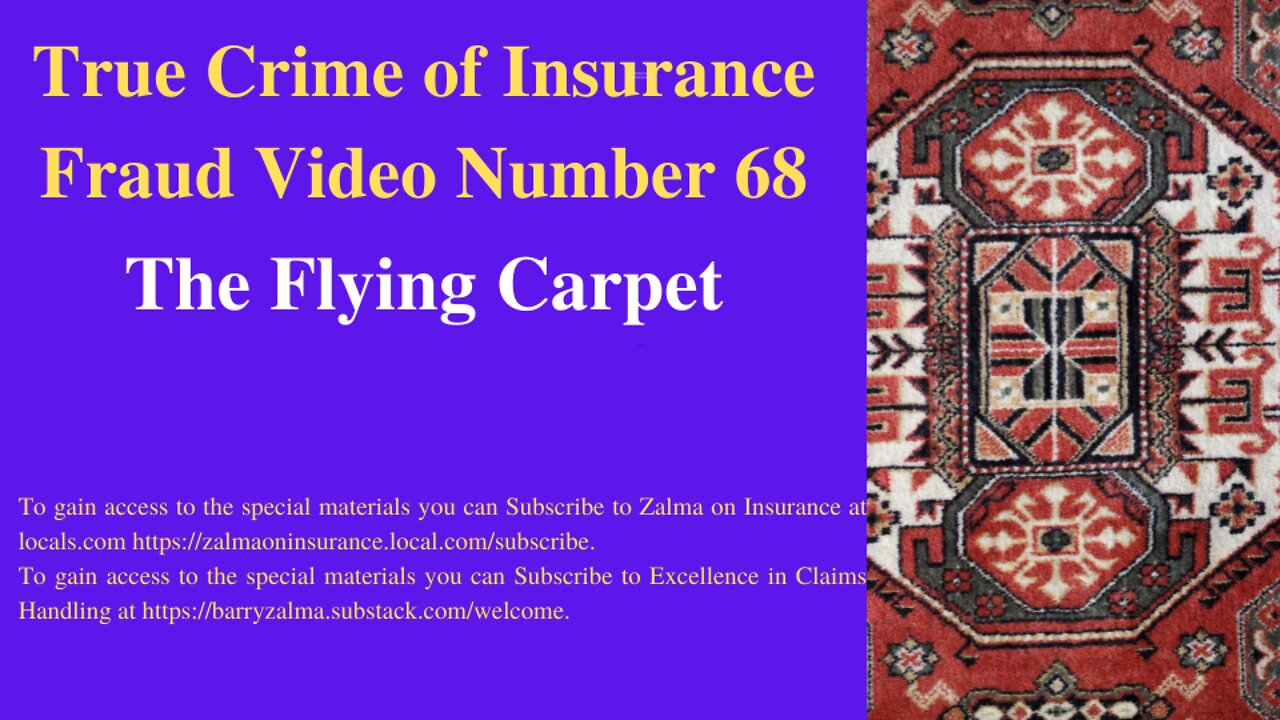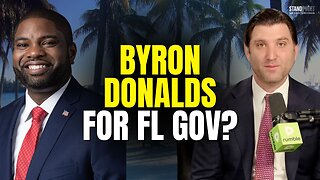Premium Only Content

True Crime of Insurance Fraud Video Number 68
The Flying Carpet
Omar T. Tentmaker had immigrated from Iran shortly before the fall of the Shah. Persian money was difficult to take out of the country. Omar purchased an entire inventory of Persian rugs and shipped them, with the rest of his household goods, to the United States. On arrival he rented a small shop in Beverly Hills, California and began selling the rugs at retail.
Omar had purchased nothing but the best. He sold the rugs to his American customers at a profit. He made a fair living but had difficulty turning his inventory into sufficient cash to live in the manner he had grown accustomed to when in Iran as a Minister in the Shah’s government.
Within six months of his arrival, living in a small apartment in West Los Angeles, Omar met a fellow immigrant who explained insurance to him. Insurance was a wonder of American society with which he was totally unfamiliar. The immigrant informed Omar that for $500 he had purchased a policy to insure his household goods. When he was the victim of a burglary, his insurer, with apparent glee, gave him a check for $20,000. It seemed the insurer paid merely because $20,000 was the first value he put down for his goods.
Omar and his fellow immigrant both knew that in their tradition one never opens a negotiation with the number one wishes to receive. His acquaintance informed him that he had demanded, for his small prayer rug, $20,000 from his insurer. He expected the insurer to negotiate the price down to its true value of $2,500. To the great surprise of Omar and the acquaintance, the insurer paid the amount demanded merely because a rug dealer had given the acquaintance an appraisal stating that the value of the prayer rug was $20,000.
Omar decided to take advantage of the great American insurance industry. In no other place in the world could Omar convert a $500 investment into a $20,000 payment. He gathered a group of his fellow Persian immigrants, most of whom were struggling in their new country. Omar provided them with a means by which they could earn money and he could become wealthy. His plan was simple. Each of his fellow immigrants would get, if they had not already done so, a policy of homeowners or tenants homeowners insurance with limits of $20,000 or more. They would wait thirty to sixty days after delivery of the policy. Each would then report that their home had been burglarized. Omar would provide each of his co-conspirator’s photographs of two to four Persian rugs taken from his inventory. They would each have an appraisal of those rugs written by Omar valuing them at between $5,000 and $20,000 each. There was no need for the rugs to leave Omar’s shop. Each co-conspirator would break one pane of a rear window in their house or apartment; report the burglary to the police; that their rugs had been stolen; and then make claim to the insurance company. For his service Omar would receive 60% of the amount paid by the insurance company to reimburse the co-conspirators for the loss of their rugs. Each co-conspirator would keep 40%. Everyone would be happy and Omar would soon be rich.
Each immigrant received instruction how to deal with their insurance company and how to authenticate the existence of the rugs they claimed stolen. They would tell the insurance company that they had no receipts. The rugs, each would claim, had been purchased in Iran. When the Shah fell, they brought them with them as household goods.
Since U.S. Customs makes no record of the goods immigrants bring with them, other than the fact that household goods entered, there was no record of the ownership or transport of the rugs from Iran. The claimants would then tell the adjuster or investigator that, being unfamiliar with the United States and the value of things in the United States, they had sought the professional opinion of a rug merchant in Beverly Hills who had provided them with an appraisal. Surprised at the dollar value of the rugs, they had purchased insurance to protect themselves.
The insurance company, faced with a seemingly valid appraisal and an insured who could establish his possession of the rugs by photographs, had no option but to pay the claims.
Omar, being a wise man, alternated the different types and kinds of rugs he gave to his co-conspirators. No two co-conspirators reported the loss of the same rug.
By the time ISO, and the insurance industry realized what was happening and changed their policies, Omar had purchased for cash a $3,000,000 house in Beverly Hills. He became the owner and operator of a new Rolls Royce Silver Cloud. His business moved to a storefront on Rodeo Drive in Beverly Hills. He sold the rugs his co-conspirators had reported stolen to various wealthy individuals in Beverly Hills for four times their actual value. He continued his conspiracy for several years until insurers changed their policies and limited the payment for the theft of a Persian rug to $1,000. In addition, his sales were good and his collection began to shrink. Omar decided to retire.
Omar purchased a business-owners policy (BOP) insuring his entire inventory for $2,000,000 based upon an appraisal performed by himself. He sold his entire inventory for $200,000 to an Armenian rug dealer from London, England. He then reported a burglary at the Rodeo Drive store. Omar claimed his entire inventory was stolen. The insurer who had agreed to the appraisal performed by Omar at the time he bought the policy, although suspicious, paid the claim in full. It saw no escape from a bad faith suit.
Mr. Tentmaker now spends his days in his garden and his nights playing cards with his fellow immigrants at the Persian- American Cultural Center. He is considered a leader of the community.
Before the ISO changed the homeowners program to include a special limit of liability for theft of antique rugs, homeowners insurers found themselves faced with reports of the thefts of thousands of antique Persian rugs valued between $10,000 and $20,000 each. Although most of the claims appeared suspicious, the insurers were unable to prove the nonexistence of the rugs and were compelled to pay claims.
When the special limit of liability was adopted, the rash of Persian rug thefts stopped. It was as if a ring of burglars suddenly left the country.
The fraudulent Persian rug claim industry ceased doing business.
Immigrant communities in Los Angeles, New York, Chicago and other major cities found other ways to earn money.
ZALMA OPINION
Sometimes, the easiest way to avoid fraudulent claims is to take away the subject matter. The immigrant community found a way to get rich off Persian rugs and that scheme was defeated by changing the policy to the limit that could be recovered for theft of a Persian rug.
(c) 2022 Barry Zalma & ClaimSchool, Inc.
Barry Zalma, Esq., CFE, now limits his practice to service as an insurance consultant specializing in insurance coverage, insurance claims handling, insurance bad faith and insurance fraud almost equally for insurers and policyholders. He practiced law in California for more than 44 years as an insurance coverage and claims handling lawyer and more than 54 years in the insurance business. He is available at http://www.zalma.com and zalma@zalma.com.
Subscribe to Zalma on Insurance at locals.com https://zalmaoninsurance.local.com/subscribe.
Subscribe to Excellence in Claims Handling at https://barryzalma.substack.com/welcome.
Write to Mr. Zalma at zalma@zalma.com; http://www.zalma.com; http://zalma.com/blog; daily articles are published at https://zalma.substack.com. Go to the podcast Zalma On Insurance at https://anchor.fm/barry-zalma; Follow Mr. Zalma on Twitter at https://twitter.com/bzalma; Go to Barry Zalma videos at Rumble.com at https://rumble.com/c/c-262921; Go to Barry Zalma on YouTube- https://www.youtube.com/channel/UCysiZklEtxZsSF9DfC0Expg; Go to the Insurance Claims Library – https://zalma.com/blog/insurance-claims-library/d
-
 8:57
8:57
Barry Zalma, Inc. on Insurance Law
1 year agoNo Coverage for Benefits no Right to Bad Faith Damages
193 -
 2:12:58
2:12:58
Robert Gouveia
6 hours agoSenator's Wife EXPOSED! Special Counsel ATTACKS; AP News BLOWN OUT
72.8K41 -
 55:07
55:07
LFA TV
1 day agoDefending the Indefensible | TRUMPET DAILY 2.25.25 7PM
33.7K14 -
 6:09:26
6:09:26
Barry Cunningham
13 hours agoTRUMP DAILY BRIEFING - WATCH WHITE HOUSE PRESS CONFERENCE LIVE! EXECUTIVE ORDERS AND MORE!
86K52 -
 1:46:37
1:46:37
Game On!
7 hours ago $0.51 earnedPUMP THE BRAKES! Checking Today's Sports Betting Lines!
51.6K3 -
 1:27:21
1:27:21
Redacted News
7 hours agoBREAKING! SOMETHING BIG IS HAPPENING AT THE CIA AND FBI RIGHT NOW, AS KASH PATEL CLEANS HOUSE
198K245 -
 1:08:28
1:08:28
In The Litter Box w/ Jewels & Catturd
1 day agoCrenshaw Threatens Tucker | In the Litter Box w/ Jewels & Catturd – Ep. 749 – 2/25/2025
116K57 -
 44:57
44:57
Standpoint with Gabe Groisman
1 day agoWill Byron Donalds Run for Florida Governor? With Congressman Byron Donalds
60.8K10 -
 1:06:25
1:06:25
Savanah Hernandez
6 hours agoEXPOSED: FBI destroys evidence as NSA’s LGBTQ sex chats get leaked?!
81.9K30 -
 1:59:58
1:59:58
Revenge of the Cis
8 hours agoEpisode 1452: Hindsight
68.7K11